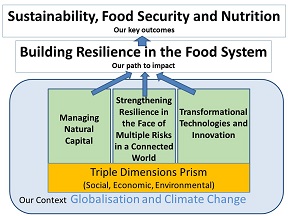About the Co-operative Research Programme
The Co-operative Research Programme: Sustainable Agricultural and Food Systems (CRP), established in 1979, aims to strengthen scientific knowledge and provide relevant scientific information to feed into future policy decisions related to the sustainable use of natural resources, in the areas of food, agriculture, forests and fisheries. International co-operation in these fields becomes increasingly important as food production systems are more and more globalised.
The CRP promotes such international co-operation annually through funding conferences/workshops and research fellowships related to three themes.
The CRP concentrates on broad research themes within each of which are priority areas of research. Operating on a 5-year cycle, the CRP reviews, updates and amends the research themes and priority areas of research to keep abreast of new developments in agriculture, food, fisheries and forest research.
Theme 1: Managing natural capital helps to ensure the availability and the quality of natural resources.
Theme 2: Strengthening resilience in the face of multiple risks in a connected world through research helps to anticipate, pre-empt and cope with potential and real impacts on agricultural systems and food security.
Theme 3: Transformational technologies and innovation make it possible to achieve a step change.
How does the CRP work?
The Governing Body comprises a representative from each member country. It agrees the programme of work, the budget and selects the fellowships and conferences to be funded. Forum Sessions on different topics are hosted by the Governing Body of the Co-operative Research Programme at its annual meetings.
The Scientific Advisory Body, made up of six eminent scientists with agricultural research administration experience nominated by the Governing Body, is responsible for the scientific contents of the Programme. It has for important mission to review applications for funding to ensure their scientific quality and makes recommendations to the Governing Body.
National Correspondents are responsible for promoting the CRP among scientists and institutions in their countries. There is one national correspondent for each member country (for some, it is the same person as the Governing Body representative).
The Secretariat, at OECD headquarters in Paris, is responsible for the day-to-day operation of the programme and provides a central contact point.
Funding for the CRP is provided through the financial contributions of the CRP’s member countries.
Contact
For questions regarding the Co-operative Research Programme, please contact the CRP Secretariat:
Trade and Agriculture Directorate
Organisation for Economic Co-operation and Development
2, rue André Pascal
75775 Paris Cedex 16
France
Information on Member countries and national correspondents
The Co-operative Research Programme (CRP) currently has 30 member countries. Below is a list of countries, a file which gives general information on the country's research institutes and universities and the contact information for their national correspondents.
- Australia Dr. Andy SHEPPARD
- Austria [Country file] Ms. Sanda PASC-WANDL
- Belgium [Country file] Mme Véronique DEWASMES
- Canada Mr. Mickael LEPAGE
- Chile [Country file] Mr Jack BRADY
- Colombia Mr. Álvaro Andrés MARTÍNEZ RODRIGUEZ
- Czechia [Country file] Ms. Šárka ŠTEJNAROVÁ
- Denmark Mr. Bjarne THOMSEN
- Estonia [Country file] Dr. Katri LING
- Finland [Country file] Professor Pirjo PELTONEN-SAINIO
- France Ms. Ségolène HALLEY-DES-FONTAINES
- Germany Prof. Dr. Jens DAUBER
- Hungary Prof. András SZÉKÁCS
- Ireland Mr. Philip KENNEDY
- Israel Dr. Michal LEVY
- Italy Ms. Silvia BARALLA
- Japan Dr. Ichiro NAKAYAMA
- Korea Yong-han KIM and Ee-hyang KWON
- Latvia [Country file] Ms Diāna LĪVA
- Lithuania [Country file] Ms Vilma KRAUJALYTE
- Netherlands [Country file] Ms. Saske HOVING
- New Zealand Mr. Alan COULSON
- Norway [Country file] Mr. Rune GROVEN
- Slovak Republic [Country file] Ms. Kristina GENDOVA RUZSIKOVA
- Spain Dr. Violeta CARRASCO
- Sweden [Country file] Ms. Sara GRÄSLUND
- Switzerland Dr. Astrid WILLENER
- Türkiye Ms. Gülden YAVUZ ÖNÇIRAK
- United Kingdom Mr. Chris BARKER
- United States Ms. Marcella WITTING


